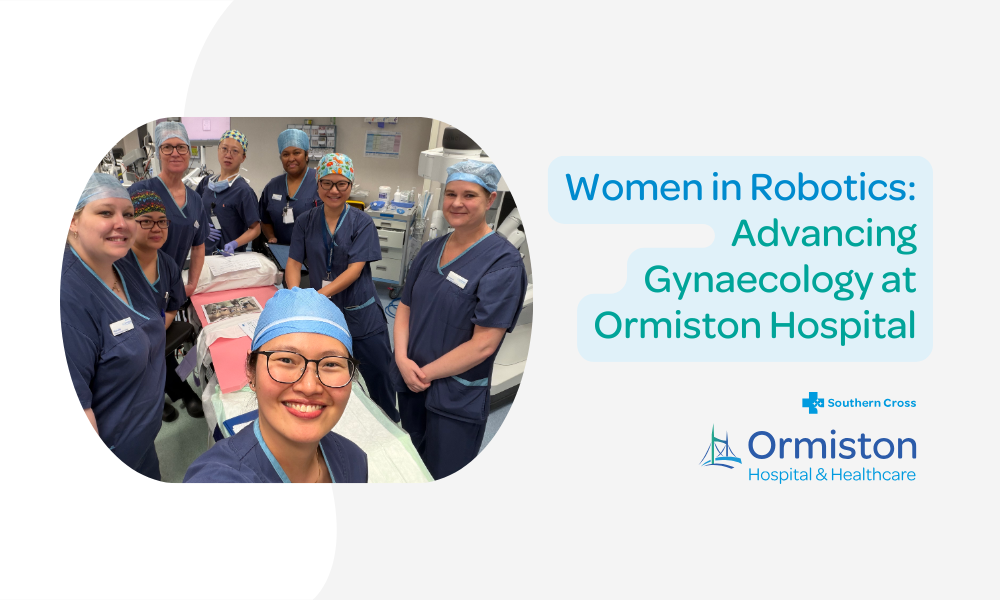We provide a holistic approach to your treatment so that Ormiston Weight Loss Service patients are better able to succeed in their weight loss goals.
Our dedicated team includes:
- Two expert bariatric surgeons
- An experienced weight loss dietician
- Physiotherapist
- Psychologist
Our team understands that being overweight is not simply a weight problem. It is a chronic condition where your overall health is at risk. Weight loss surgery is a proven medical procedure for long-term and effective weight loss.
Weight loss surgery is typically recommended in the following cases:
- Obesity – You have a BMI of 40 or greater, or a BMI between 30-40 with an obesity-related condition (for example diabetes, high blood pressure, sleep apnea)
- You are unable to lose weight despite medication, dietary and lifestyle changes
- You are willing to commit to healthy diet and lifestyle changes, along with long-term follow-up appointments
At Ormiston Hospital & Healthcare, we understand the impact excess weight can have on your health and lifestyle. We offer a private, safe hospital environment with surgeons who have over 20 years of experience.
Our specialised service (OWLS) offers you different options to achieve weight loss. Read below for more information on the surgical options we offer.
Surgical procedures:
Gastric Bypass
A gastric bypass involves making the stomach smaller as well as changing how it connects to the small intestine. It is more invasive than the gastric sleeve procedure as the surgeon creates a small pouch at the top of your stomach, and then re-routes the lower part of your small intestine to connect directly to the new pouch. This effectively bypasses your stomach and the upper part of your small intestine.
Weight loss is achieved as your stomach is now much smaller, meaning you are fuller sooner and for longer with less food. The way your body absorbs nutrients and calories is also different as your digestive tract has been altered, and this can lead to significant weight loss.
Gastric bypass is a permanent procedure. It is performed laparoscopically (keyhole surgery) and typically takes 2–3 hours.
Gastric Sleeve
Your surgeon may recommend gastric sleeve surgery. This is a permanent procedure where 80% of the stomach is removed creating a narrow tube (a sleeve) instead of the original stomach sac. It is performed laparoscopically (keyhole surgery), making this procedure minimally invasive, and normally takes 30-45 minutes. The smaller stomach restricts the amount of food that can be eaten, so you feel fuller sooner and for longer, resulting in weight loss.
Need to know
Read the content on our site to learn more about what weight loss surgery options are available. From here you can make a consultation appointment with a bariatric surgeon (for surgical procedures) to discuss your unique needs and goals.
During your private consultation, your surgeon will ask a few questions about your current health condition and take a detailed account of your medical history. They will perform a physical examination and discuss the risks and benefits associated with weight loss surgery. Your weight loss goals will be discussed, and your surgeon will determine if surgery is an appropriate treatment for you. If you wish to go ahead with the procedure, you can then work with the admissions team to book in with our dietician and clinical psychologist and arrange a date for your surgery.
Before your surgery date, you will have consultations with both the dietician and clinical psychologist on your care team. You will meet with our dietician to go through your new diet requirements, and you may be prescribed medication prior to surgery. You will also meet with a clinical psychologist from The Psychology Group in Auckland who will create personalised strategies with you to best prepare you for surgery and maintain weight loss following surgery. Both meetings are a requirement before you can move forward with your surgery date.
Your surgeon will likely require you to undergo some blood tests prior to surgery, and you may be required to lose some weight before surgery to ensure the procedure can be safely performed.
You will meet with your surgeon once more prior to your surgery date and it is important to follow their instructions, which typically include fasting the night before, so your stomach is empty the day of the procedure.
During surgery, you will be given general anaesthesia so that you are asleep during the procedure. Throughout the surgery, your vital signs are closely monitored to ensure the procedure is as smooth and efficient as possible.
The surgeons will make small incisions in your abdomen to access your stomach or intestines, and the surgery is typically done laparoscopically (keyhole surgery). This means it is minimally invasive and the surgeons use a laparoscope (small camera) to guide them.
Depending on the type of weight loss procedure, different things can happen:
Gastric Sleeve Surgery: A large portion of the stomach is removed, leaving a narrow tube or “sleeve”.
Gastric Bypass Surgery: A very small pouch is created out of the stomach, and this is attached directly to the small intestine. The stomach is bypassed along with the first part of the small bowel.
After surgery, you will be taken to a recovery area where medical staff will monitor your vital signs and ensure you are recovering well from the anaesthesia. Patients can stay for two nights in one of our private hospital rooms. Recovery varies between patients, and you may request to stay longer at your own cost until you are comfortably back on your feet.
Our physiotherapist will visit you throughout your stay to help get you moving and offer post-surgery exercise advice.
After surgery, you will start on a liquid diet before moving to a pureed diet while your stomach heals. Several weeks after surgery you will progress to eating three small meals a day of normal consistency food. Entrée-size meals are enough to make you feel full, making it easier for you to limit the amount of food eaten.
We look after our patients for a 12-month period following surgery, with regular follow-up appointments and nutritional support. You will see your surgeon for three follow-up appointments, and you will receive regular support from our dietician to ensure you are adopting a healthy diet and exercising regularly. Additionally, we offer optional support from our clinical psychologist.
Weight loss surgery is a proven treatment to successfully maintain long-term weight loss. Excess weight can have many effects on your overall health as well as your self-esteem. Some of the potential benefits of weight loss surgery are:
- Significant weight loss over a long-term period
- Improvement in health disorders related to obesity (diabetes, heart disease, sleep apnoea)
- Improvements in quality of life
- Increased life expectancy
It is important to note that surgery on its own does not result in sustainable weight loss. That is why Ormiston Hospital offers a multidisciplinary team to support healthy changes to your diet and lifestyle, so you get the full benefit from your surgery.
Weight loss surgery is considered major abdominal surgery, and whilst generally considered safe, there are significant risks associated with it.
The most serious complication is a leak. This can occur anywhere along the joining of the newly created stomach pouch and the intestines in gastric bypass surgery, or in the case of a gastric sleeve, anywhere along the newly formed stomach tube. This normally occurs within days of the surgery and can cause infections and requires additional surgery.
Your surgeon will discuss all potential complications of the surgery with you, such as excessive bleeding, infection, or an unexpected reaction to the anaesthesia.
Both gastric sleeve and gastric bypass surgeries are laparoscopic procedures, which have the advantage of being less painful with a faster recovery, a shorter hospital stay, and less chance of wound infections. If your surgeon cannot complete the procedure laparoscopically, they can safely switch to an open surgery with larger abdominal incisions. Your surgeon will discuss the risks associated with open surgery with you prior to your procedure.
Specialist Surgeons








